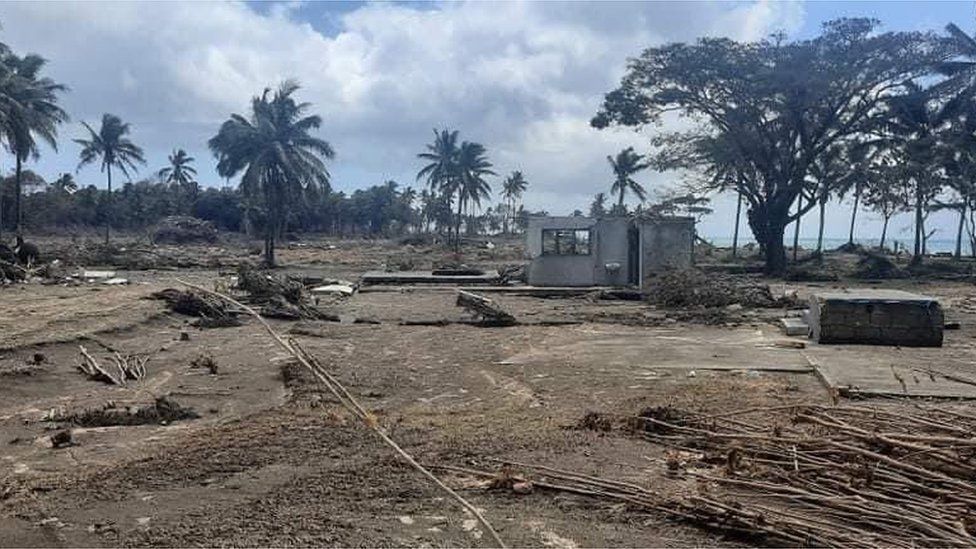Tonga volcano: 84% of population affected by ash fall and tsunami.
The Tongan government has said that as many as 84% of its 105,000 population had been affected by ash fall and a tsunami triggered by an underwater volcanic eruption.
Tsunami waves from the volcano swept Tonga last week, destroying villages, buildings and the coast.
The government did not report any deaths besides the three people known to have been killed in the tsunami.
It said there were under two dozen injuries, most from Nomuka island.
The three victims have been identified as Lataimaumi Lauaki a 49-year-old woman from Nomuka, Telai Tetu'ila, a 65-year-old man from Mango, and British national Angela Glover, 50, whose death was confirmed by her family last week.
Tonga's deadly tsunami
The latest update from the Tongan authorities was shared on Monday by Australia's diplomatic mission on the island, but dated to Friday.
It noted that 62 people on Mango, one of the worst-hit islands, had to be relocated to Nomuka "after losing their homes and all of their personal belongings."
Rescuers have set up a field hospital there after the existing clinic was swept away in the tsunami.
The government added however, that many of those residents may be moved again to the main island Tongatapu due to a lack of food and supplies.
Water remains the key need on the islands. But officials noted that despite the ash fall, testing in recent days had cleared ground water and rainwater as safe to drink.
Ships and planes carrying foreign aid have been arriving in Tonga since last week, after locals were finally able to clear the island's only airport runway of ash.
New Zealand and Australia have led the international response, using their airforce and naval carriers to make contact-less drops of supplies including water, food, hygiene kits, tents as well as water-treating and telecommunications repair equipment.
The remote archipelago was cut off for five days because the explosions severed the sole fibre-optic sea cable bringing internet to the island.
A patchy telephone line was restored last week, allowing "limited international phone calls".
But even communication between Tongatapu, the main island, and the outer islands remains "an acute challenge", the Tongan government statement said.
They added that a ship was due to arrive this week to repair the internet cable. Firms had previously estimated the cable could take up to four weeks to repair.
The arrival of foreign aid has vastly accelerated the flow of information from the stricken island.
Due to Covid fears, the aid work is still all being carried out by locals through groups like the Red Cross. Tonga, which is effectively Covid-free, has requested no foreign aid workers land in the country to prevent an outbreak.
But the UN's representative in the region told the BBC that could change given the scale of damage.
"It was practice in previous disasters like Cyclone Gita [in 2018], and this disaster is a lot more severe than that," said Sione Hufanga, the UN representative in Tonga.
"This is a global response that we provide humanitarian and technical support to the country affected," he said.
BBC.

